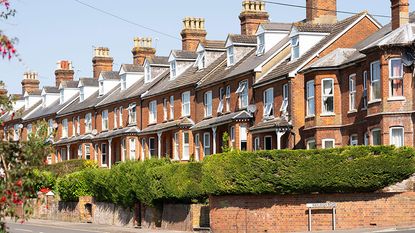UK house prices see their biggest December drop in four years
According to Rightmove’s house price index average asking prices dipped 2.1% in December.


The average asking price of UK homes fell 2.1% over the last month according to Rightmove’s house price index – the biggest December dip in four years.
According to the online property portal, the average asking price of properties on its platform was £359,137 in December, down £7,862 from November.
The decrease follows a 1.1% dip in November, and adds to the growing amount of data showing the UK property market is cooling down after two years of rapid house price growth.
Subscribe to MoneyWeek
Subscribe to MoneyWeek today and get your first six magazine issues absolutely FREE

Sign up to Money Morning
Don't miss the latest investment and personal finances news, market analysis, plus money-saving tips with our free twice-daily newsletter
Don't miss the latest investment and personal finances news, market analysis, plus money-saving tips with our free twice-daily newsletter
Last week Halifax’s house price index showed the biggest dip in UK house prices since 2008. The lender reported a 2.3% fall in house prices, and a decrease in the annual rate of growth to 4.7% from 8.2% in October.
The dip is “an understandable short-term reaction to the economic turmoil and unexpectedly rapid mortgage rate rises and reduction in availability of mortgage products that we saw in late September and October, before things began to settle down,” says Tim Bannister, Rightmove’s director of property science.
“Despite this we end the year with average asking price growth of 5.6%, which is only slightly lower than the 6.3% last year.”
Why are UK house prices falling?
Kwasi Kwarteng’s infamous mini-Budget prompted a steep hike in borrowing rates. This in turn sent mortgage rates to over 6%, peaking at 6.65%, the highest they had been since the financial crisis in 2008, making many buyers question whether now was a good time to buy a house.
While they have since begun to decrease – the average two-year mortgage rate is 5.99% and the average five-year mortgage rate is 5.74% – they are much higher than they were this time last year.
“It’s understandable that some buyers are distracted, not only by the festive season, but also by the thought that they may get a better fixed-rate mortgage deal and a more stable outlook by waiting until the new year,” said Bannister.
“Our data suggests that there are many ready-to-go movers out there waiting for what they feel to be the right time to enter the market in 2023.”
Interest rates are likely to remain high for the foreseeable future. The next Bank of England meeting is on 15 December, and City analysts believe it will hike rates further from the current 3% as it tries to rein in rising inflation.
As well as higher borrowing rates we’re all having to contend with the rising cost of living, which is being driven by higher energy prices and rising food inflation.
Where next for UK house prices?
UK house prices saw two years of booming growth as people moved to bigger houses and away from cities throughout the pandemic, taking advantage of the stamp duty cuts introduced by Rishi Sunak.
Kwarteng introduced even more generous cuts in September, however current chancellor Jeremy Hunt has said these will come to an end in 2025.
Rightmove estimates average asking prices will fall 3% next year as “economic headwinds continue to soften activity” and normalise the market. It expects the market to return towards a pre-pandemic level throughout next year.
Meanwhile the Office for Budget Responsibility has forecast a 9% decrease in house prices by 2024.
Where house prices go will be determined by a series of external factors, including where interest rates go from here, whether energy prices continue to rise, and the general cost of living.
Nic studied for a BA in journalism at Cardiff University, and has an MA in magazine journalism from City University. She joined MoneyWeek in 2019.
-
-
 Investment trust discounts hit 2008 levels. Here’s how to profit
Investment trust discounts hit 2008 levels. Here’s how to profitInvestment trust discounts have risen to levels not seen since 2008, here are three trusts looking to buy to profit.
By Rupert Hargreaves Published
-
 A luxury stock to buy at a high street price
A luxury stock to buy at a high street priceInvestors wrongly consider Watches of Switzerland a high-street outlet.
By Dr Matthew Partridge Published
-
 Investing in wine: how Cru Wine is reaching new audiences
Investing in wine: how Cru Wine is reaching new audiencesTips Gregory Swartberg, founder of fine wine specialist Cru Wine, talks to Chris Carter about how to start a wine collection
By Chris Carter Published
-
 Small companies with big potential
Small companies with big potentialMichael Taylor of Shifting Shares reviews his 2023 picks and highlights more promising minnows.
By Michael Taylor Published
-
 The MoneyWeek portfolio of investment trusts – July 2023 update
The MoneyWeek portfolio of investment trusts – July 2023 updateTips A decade ago we set up the MoneyWeek portfolio of investment trusts. They remain a compelling long-term bet says Rupert Hargreaves
By Rupert Hargreaves Published
-
 Women lead the way with ethical investments
Women lead the way with ethical investmentsDemand for more ethical investments has soared – and women are more likely to opt for them. Annabelle Williams, personal finance specialist at Nutmeg, takes a look at why.
By Annabelle Williams Published
-
 BoE: Mortgage payments to rise by £220 a month for households
BoE: Mortgage payments to rise by £220 a month for householdsMillions of households can expect a mortgage spike of around £200 a month - and some may even reach a extra £1,000 a month, the Bank of England warns
By Marc Shoffman Published
-
 What happened to Thames Water?
What happened to Thames Water?Thames Water, the UK’s biggest water company could go under due to mismanagement and debt. We look into how the company got itself into this position, and what investors should expect.
By Simon Wilson Last updated
-
 Where to invest in the metals that will engineer the energy transition
Where to invest in the metals that will engineer the energy transitionA professional investor tells us where he’d put his money. This week: John Ciampaglia, manager of the Sprott Energy Transition Materials UCITS ETF.
By Nicole García Mérida Published
-
 How investors can profit from high food prices
How investors can profit from high food pricesThe latest furore over grocery prices will die down, says David Stevenson. But the long-term outlook for soft commodities remains bullish. These are the stocks investors can buy to profit from high food prices.
By David J Stevenson Published









